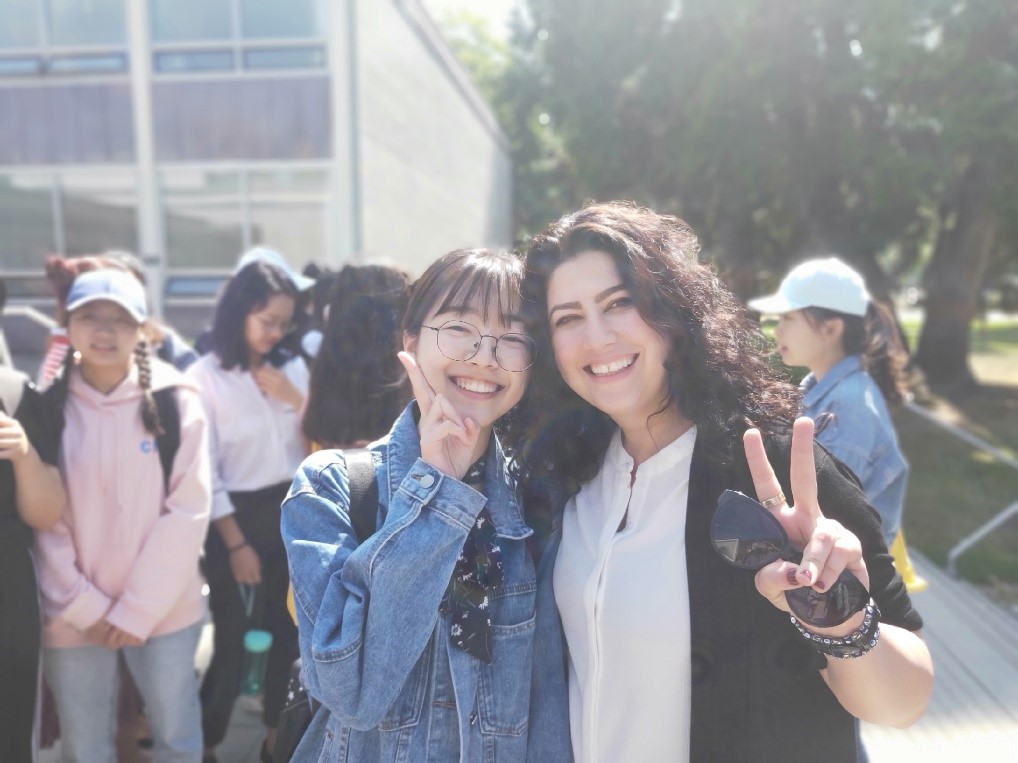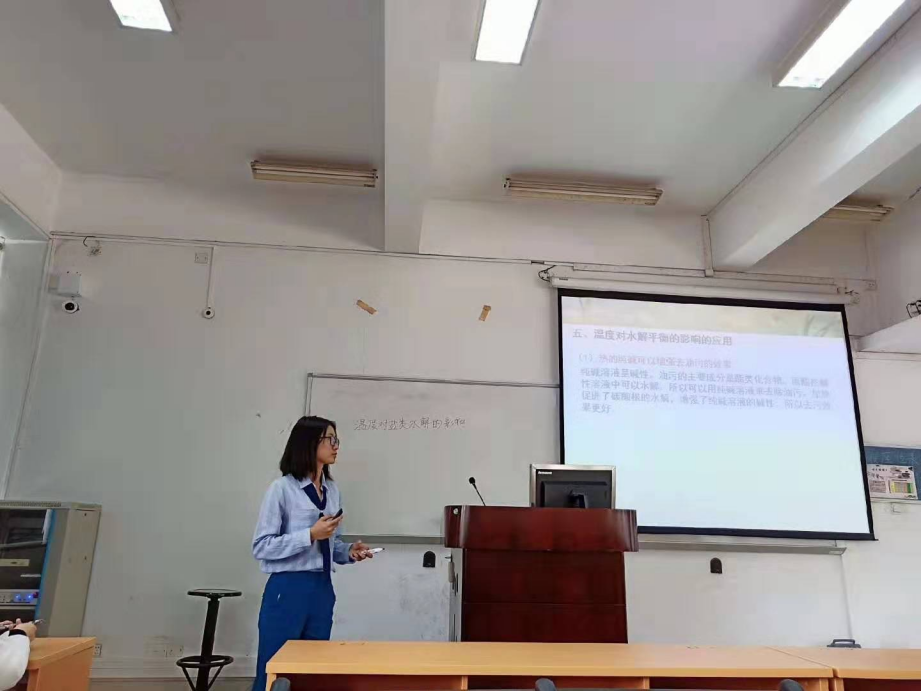
Likes
Editor's Note: Under the theme of “Challenge and Change”, the second English writing contest of SCNU has came to a close with over 280 articles from 28 schools and colleges. We recognize all prize winners for their excellent performance. Awarded winners have been announced (see results), and all winning articles will be published in this column.
-------
By Ruan Jiazhi
Under the influence of the global spread of the coronavirus, almost everyone's life has changed more or less. However, international students may encounter more challenges than imagined. For one thing, the external environment changed as a result of the outbreak of the pandemic bringing tremendous stress to international students.
The inaccurate reports and misinterpretations by some Western media on China's defense measures against the coronavirus incited discrimination against Chinese students. According to reports from Western media such as the BBC news, there are endless acts of insulting and even beating of Chinese students in Western countries such as the UK, Australia, and the US. Some restaurants even hung up notices prohibiting Chinese from entering.
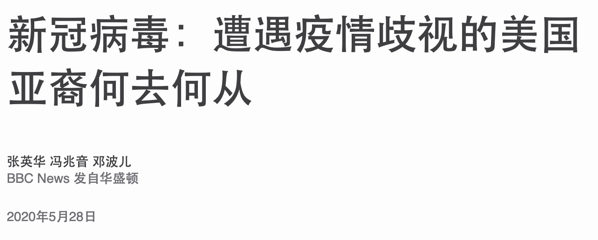
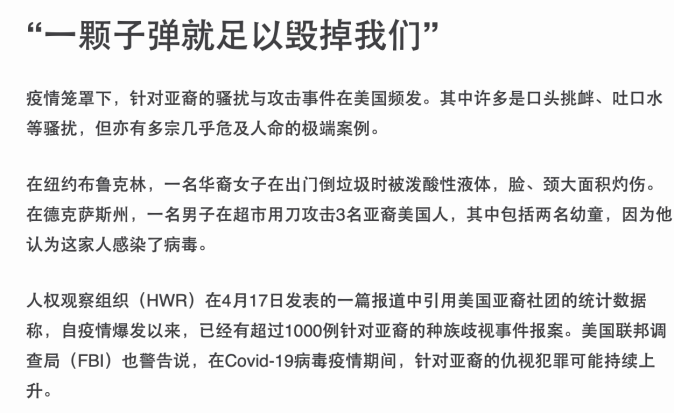
A screenshot from the BBC Chinese website reports on discrimination against Asian Americans during the epidemic.
The rapidly spreading epidemic led to a shortage of medical supplies. Protective materials such as masks and hand sanitizer were not available through e-commerce platforms such as Amazon or physical pharmacies. Therefore, it was difficult for international students who chose to stay to take preventive measures. In addition, the epidemic resulted in a chaos in global air traffic, causing many flights to be cancelled.
According to the "five-one policy" issued by the Civil Aviation Administration of China, one airline can only navigate one waypoint in one country and can only fly once a week. Therefore, international students who had plans to return to China had to face the risks of high-priced air tickets and unexpected cancellation. Besides, some media's one-sided reports on the surge of imported cases from abroad caused the domestic public's cautious attitude towards international students.
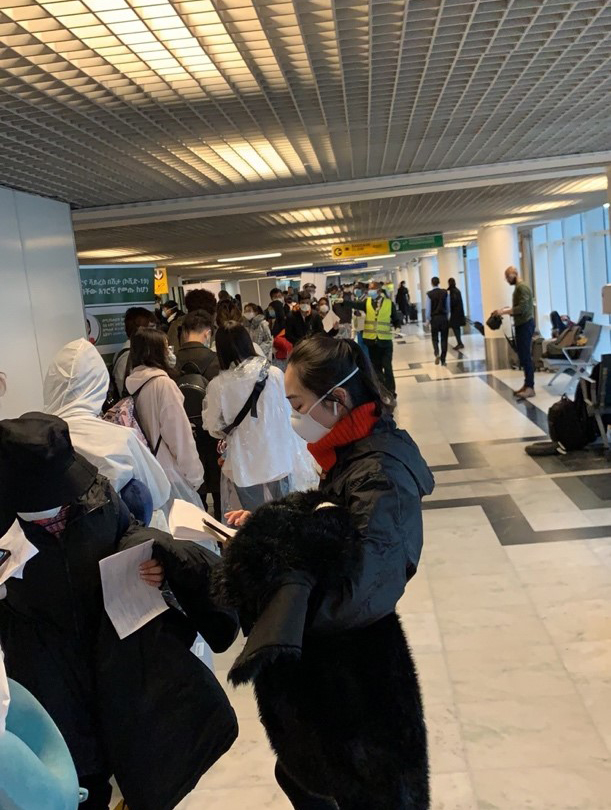
The author queued up at the Ethiopian airport on his way back home on 17 March, 2020.
For another, international students also faced predicaments in academic study. Students staying abroad were confronted with high risks of infection when attending courses and purchasing necessities because other individuals, especially Westerners, did not pay sufficient attention to the pandemic. While they took their preventive measures, masks might become a reason for bias and ridicule.
For students who have returned to China, the change in learning mode might impact their academic performance. The transition of courses from classroom teaching to on-line teaching increases the difficulty of learning. First of all, due to the incompatibility of international network lines, international students often encounter network problems such as freezes and crashes during on-line classes. Secondly, students have to attend on=line courses in the early morning and other abnormal working hours due to the time difference. Furthermore, compared to previous face-to-face conversations, the communication between students and their tutors via email is inefficient. In addition, transformations in assessment methods and degree awards might cause significant uncertainty and challenges to international students.
According to the latest QS analysis, 61% of prospective international students state that the coronavirus has affected their plans to study abroad. Of those respondents, 55% now intend to defer or delay their entry until next year. One illustration is that the cancellation of various qualification tests such as IELTS, TOEFL, GMAT, etc., may negatively affect the application process.
Nevertheless, the difficulties caused by the pandemic also brought many opportunities to international students. First of all, there is no doubt that international students cultivate a global perspective during the pandemic. International students have a natural advantage over domestic students and foreign students in obtaining information because they have a clear understanding of the coronavirus's entire cause and effect from its appearance in Wuhan to its global outbreak. This advantage means that international students may objectively compare the measures and responses of various countries to the spread of the epidemic so as to have a more comprehensive understanding of the differences in the impact of different regions, cultures, and systems on social values.
Secondly, overseas student groups become more united. Since the global epidemic outbreak in March 2020, international students from various countries have shared their experience on social media such as Weibo, Facebook, and Twitter. They shared local progress of the local measures against the pandemic, detailed processes of buying air tickets home, and learning guidance for on-line courses and alternative assessment.
Also, Chinese overseas student organizations show more powerful cohesion. In addition to cooperating with the local consulate in distributing "health packs" to Chinese students, they also organized charity activities to assist students in need and even local communities. In other words, the patriotism of international students will be more prominent. Moreover, overseas students' active prevention measures indirectly refuted some distorted remarks of China's anti-epidemic measures in the early stage of the epidemic and enhanced the world's recognition of Chinese anti-epidemic achievements.
It is foreseeable that some international students will become more outstanding and independent. Although international students who are still in their home countries may have to stay at home due to the difficult epidemic situation, social restrictions also mean that they have more time to focus on their academic studies. Furthermore, though international students who take on-line classes in China sometimes have to endure the torment of late-night courses, this experience also exercises their language skills and motivates them to develop a more reasonable and efficient schedule.
In conclusion, facing the current pandemic and the international situation that followed, overseas students have become a particular part of contemporary history. Yet challenges always co-exist with opportunities. Hopefully, international students will seize the opportunity in the challenge and chase their dreams.
References:
[1] 张婉莹.疫情下的留学生:“天上就是下刀子,我也要出国读书” [db/ol]. http://www.zhishifenzi.com/depth/depth/10449.html
[2] 张宁.疫情下出国留学面临的挑战和机遇[db/ol]. http://www.chisa.edu.cn/rmtycgj/202004/t20200424_320178.html
[3] 中国教育在线.高招报告:出国留学增速明显放缓,来华留学生人数稳定增长[db/ol]. https://news.eol.cn/yaowen/202007/t20200707_1736965.shtml
[4] 新东方. 2020中国留学白皮书[db/ol]. https://cdn.jiemodui.com/pdf/2020中国留学白皮书-中文版.pdf
[5] Global Times. Racism growing conspicuous against Asian Americans[db/ol]. https://www.globaltimes.cn/content/1190650.shtml
[6] 张英华.新冠病毒:遭遇疫情歧视的美国亚裔何去何从[db/ol]. BBC News. https://www.bbc.com/zhongwen/simp/world-52824216
What to read next:


